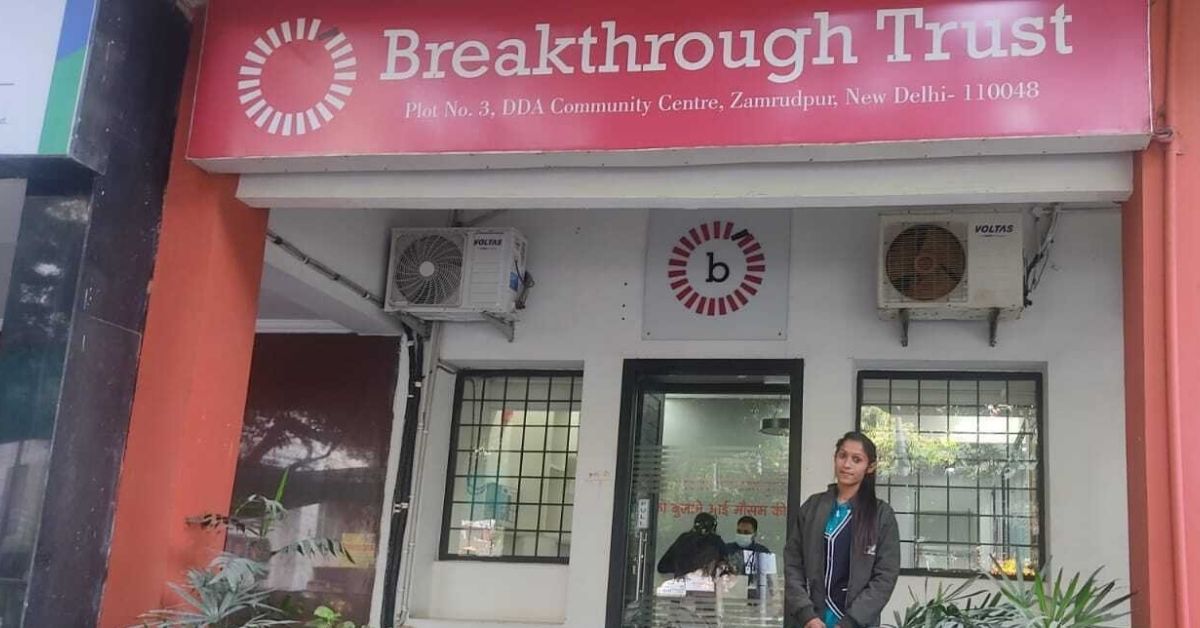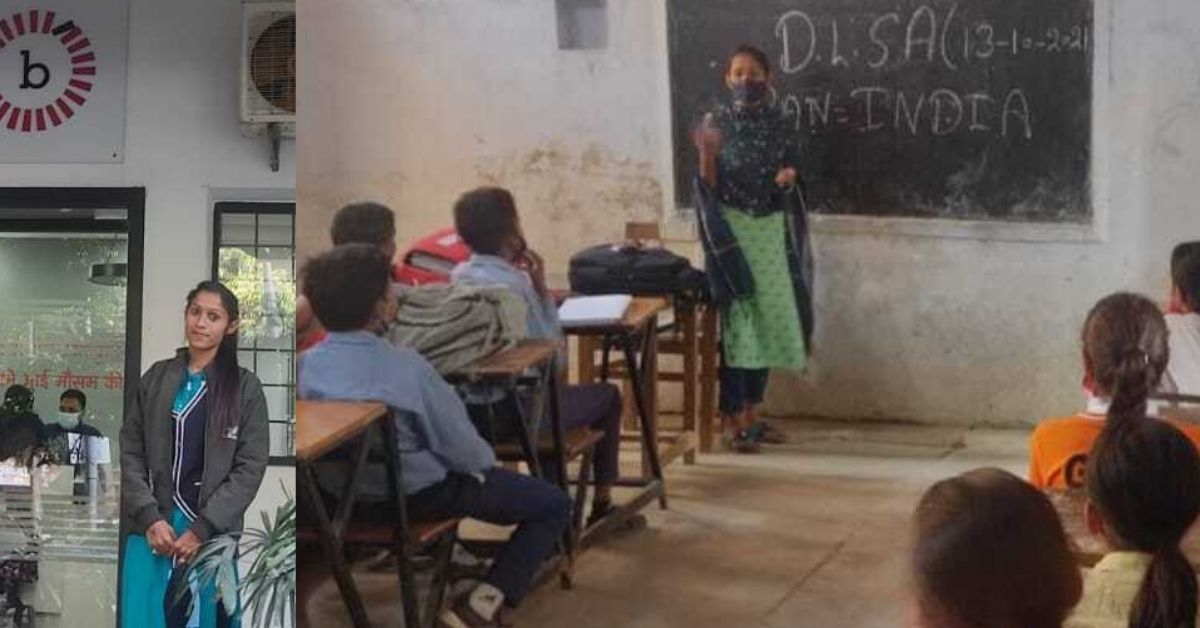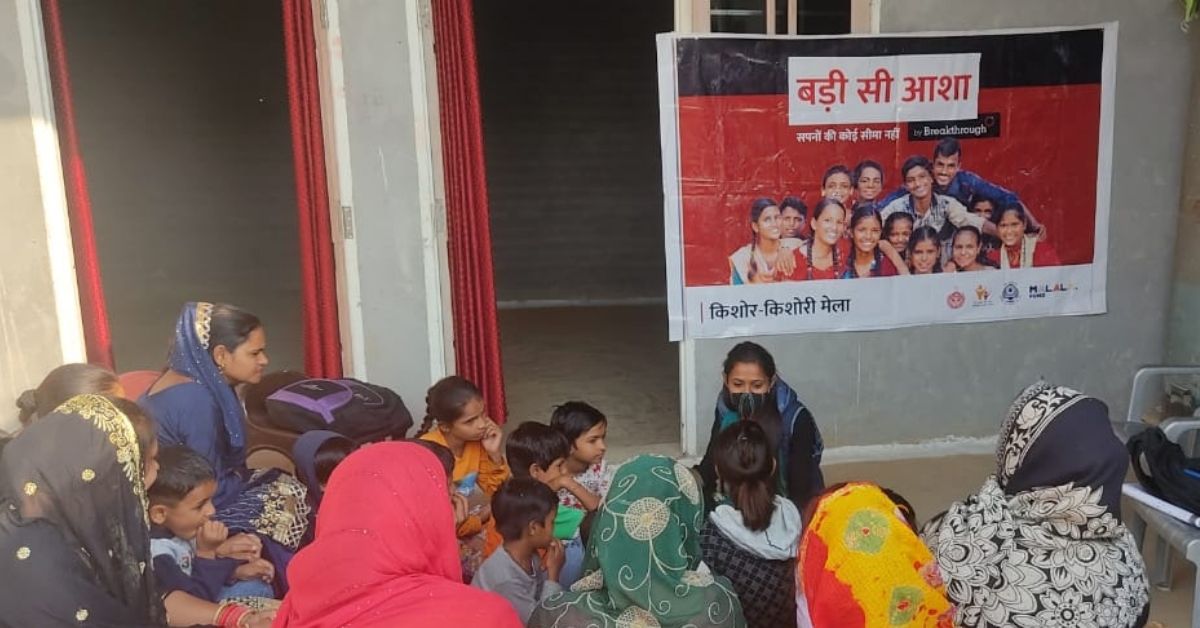This article has been published in partnership with Breakthrough India.
The 16 Days of Activism against Gender-based Violence is an annual international campaign held from 25 November till 10 December, organised by UN Women and kicked off by the Women’s Global Leadership Institute in 1991. To mark these 16 days, The Better India and Breakthrough India bring you stories of young women taking charge as catalysts of positive change in their towns, cities, villages and communities.
In Garhi Khajur village of Karnal, Haryana, 25-year-old Jyothi is leading a movement to give girls a chance for a better future. Otherwise, life here is an endless struggle against a system that turns a blind eye to the very existence of women.
In the district that showed a downward trend in the gender ratio this year, girls are married off early, and education remains a far-fetched dream for most.
“When I started going to school, there were a lot of girls studying till Class 10. But almost all of them dropped out right after,” Jyothi recalls in conversation with The Better India.
Jyothi was one of the first girls in her village to complete her education and the only girl from the area to go to college. Despite strong support from her parents, achieving this dream was no easy feat. The school in her village only went up till Class 5, so she would travel on foot to the closest one, located around 3-4 kilometres away, every day so she could continue studying.
“Child marriage is rampant in my village, and education is not a priority,” she explains. “The moment a girl turns around 15 or 16 years old, she is sent for manual labour on the fields, and not allowed to step out of her home in the evening. When she returns home, her husband beats her up, mostly over money, and she has no life beyond that.”
But as a team change leader with Breakthrough, Jyothi is changing the landscape of her village, one step at a time.
Breakthrough works to create a cultural shift and make discrimination and violence against girls and women unacceptable. It was founded by activist Mallika Dutt in 2000. The organisation began its journey with the release of Mann ke Manjeere: An Album of Women’s Dream, which talked about women’s rights through an album and a music video, as an experiment in using pop culture and media for social justice. Based out of the US and India, it aims to raise awareness about and inspire action against gender-based violence through its initiatives and programmes.
Over the years, Breakthrough has been able to bring about lasting positive changes in their intervention areas — increasing the probability of girls being enrolled in schools, the age of marriage in Uttar Pradesh, encouraging the reporting of cases of violence, and transforming gender-regressive views of adolescents, and more.
As Sohini Bhattacharya, president and CEO, says, “The primary objective of working with the youth is to help them become catalysts of change over time. We work with them to help them build a gender-equitable view for themselves, support them to transform themselves and others and be a support system in their community where gender-based violence is concerned. Our programmes such as Team Change Leaders (TCL) and Adolescent Empowerment Program (AEP) are specially designed to enable and facilitate youth leadership for positive social change, particularly in rural communities.”

‘Girls don’t lead the lives they truly want’
Jyothi first heard about Breakthrough a little over a year ago, when a member of the team came to her village to talk about the work the organisation does. “At that time I couldn’t care less, I wanted to join the Army. But after repeated discussions, they encouraged me to start small, and that’s how I became more invested in the organisation. It pushed me to think about how many unaddressed problems plague society, and that someone will have to take charge to change that. I wanted to be that person.”
For her, choosing education over the future that was otherwise laid out for her invited the ire of many village people around her. “They would say, ‘Yeh to maharani hai’ (She acts like she’s a queen), or that I was ruining the atmosphere of the village. But my parents supported me. My mother could not finish her education due to her father’s death, but my dad had studied and knew how important it was that I do too,” she says. Her mother is a homemaker, and her father works as a labourer.
Having completed her education, Jyothi says she gained a deep understanding of why other girls in her village needed to get the chance to do so as well. With a dream that every girl from Garhi Khajur should one day be able to go to college, she began helping a few from her village go for tuition.
The resistance was almost immediate when boys from the village showed up to harass the girls and try to stop them from studying. Jyothi notes that the boys also raised concerns regarding the girls being from a particular caste. “They were afraid the girls would start thinking for themselves, refuse to work in the fields or get married, and instead want to continue pursuing their education. They thought I was leading them astray,” she says.
She persevered even as the boys came and picked fights every day, and was able to carry out tuition classes despite such strong resistance.
However, the advent of the COVID-19 pandemic created a massive roadblock in Jyothi’s path. “There was immense fear around being infected. Parents also thought that schools would never reopen after the lockdown, and as a result, they began pulling out their girls and fixing their marriage. After school reopened, many girls never returned,” she says. “I went to as many as 30 families to try and convince them to send their children back to school, but it was hard.”
It was then that she began working with Breakthrough, and after speaking to two girls who wanted to go to college, she decided to take up their cause. “Their parents got the girls to register in the college, but when this news reached the grandparents, there was chaos. Their dada-dadi believed that this would be a blot on their reputation and that the girls would be disrespecting age-old traditions and customs. They called up my parents and asked them to keep me in line. My parents also started worrying, because I was out of the house all the time, working with strangers, and concerns were raised about how appropriate my behaviour was. But I assured them I was doing the right thing, and they backed me up.” Jyothi recalls.

She adds, “There was a general discomfort regarding the fact that the girls would study and mingle with boys, which the family perceived as a threat to their reputation. They’re also looking to just get these girls married off and force them to work in the field, rather than help them build a secure future. So many girls and women have broken down before me because they don’t get to lead the lives they want.”
So she took the girls to the village sarpanch, and they laid their grievances before him. The sarpanch was able to talk to the family, and the girls are now all set to attend college soon.
‘We stand together’
Jyothi says that one of the biggest hindrances in educating girls in the village is the fact that Garhi Khajur has no college. “It’s hard for them to even finish their +2, or Class 10 because they’re married off the moment they turn 15 or 16.. There’s also no high school here. Families don’t want their girls to travel outside the confines of the village,” she explains.
In a state like Haryana, culture, folklore, age-old traditions and societal laws have created a structure wherein girls are often not allowed or are afraid to even speak to elder male members in their families. So when there’s so much of a communication gap, Jyothi’s work becomes all the more significant in bringing about the much-needed change.
This is also a lesson Breakthrough tries to instill in the communities it works with. Sohini says, “We conduct different kinds of training programs and workshops to help them understand gender-discriminatory behaviours and their negative impact on the socio-economic and cultural potential of society. Amplifying youth voices and leadership so that they can not only make choices about their own lives, but also about critical issues around gender equity, climate action, and other issues is very important if we are going to build an equal and violence-free world for all.”
Meanwhile, in a first for her community, Jyothi mobilised and organised girls from Garhi Khajur to conduct a youth meeting with the sarpanch on 15 August this year.
“When I started working with Breakthrough, I once again met with the girls from the tuition classes I used to organise. We formed a sort of youth group, where we would discuss several issues — the rights of the girls, what problems they were having at home, and things like that. They suggested that on 15 August, the day of azaadi (independence), they would bring up issues that were restricting them from their freedom. They said, ‘We will go to the sarpanch, and our parents, and ask for our azaadi. ’”
And what did azaadi mean for these girls? “They wanted the freedom to go out as they pleased, to study, to speak and to voice their opinions to their family,” Jyothi shares. “They wanted a common room for girls in school, a safe playground for girls, and more. They were so motivated, and it was such a big change from when we first began tuition lessons after school. They say, ‘We have rights, so why shouldn’t we get them?’”

The sarpanch was taken aback by how girls were coming forward to voice their thoughts, wants and opinions so openly. Jyothi says that in his five years as the authority figure, he had never before seen young women stepping forward to speak this way. “In listening to them, he realised his own missed opportunities and responsibilities, and agreed to support their dreams,” she says.
Today, Jyothi works with Breakthrough full time across eight villages to raise concerns about and resolve the issues that plague women. “When I first started, I thought I was alone in my fight. But now I feel like I have support, a sisterhood, and we all stand together.”
Edited by Yoshita Rao
No comments:
Post a Comment